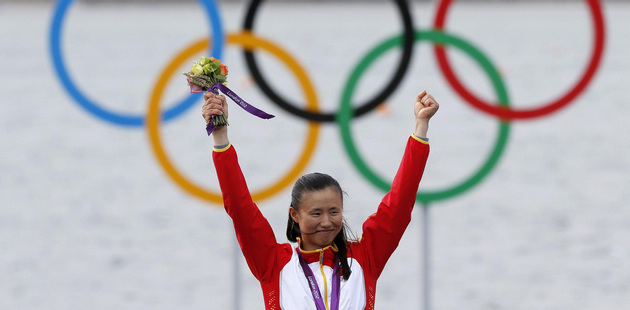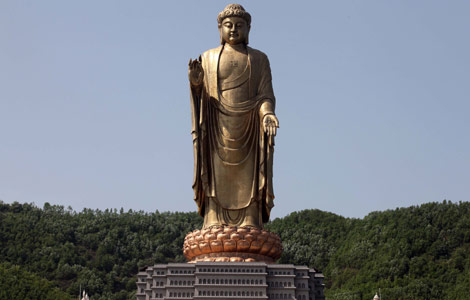The world’s a stage
Updated: 2012-08-10 16:32
(China Daily)
|
|||||||||||
Kunqu Opera will make its debut in London for the 2012 Olympics,mu Qian reports. Two rare performances of Kunqu Opera in London will transport audiences to ancient China. As part of the beijing C u l t u re We e k o rga n i ze d by t h e government of beijing, the Northern Kunqu Opera Theater will give two performances at the shaw Theatre of London — A
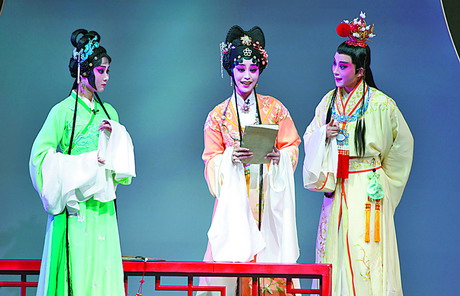
DreamofRedMansionson july 24 and ANewLegend ofpipaon the following day. “Kunqu is regarded as the ‘origin of a hundred operas’ in China,” said Cao Ying, Northern Kunqu Opera Theater’s vice-president.
“It has a history of 600 years and has influenced not only many styles of Chinese opera but also Chinese literature, music and art.”
In ADreamofRedMansions, one of China’s “Four great Classical Novels”, there are 26 depictions of Kunqu, the best-known of which is the part about the heroine Lin Daiyu being enchanted by 12 girls’singing Kunqu in the 23rd chapter.
However, there was never a Kunqu adaptation of A Dream of Red Mansions, except for some excerpts, until the Northern Kunqu Opera Theater premiered their version last year.
“ A Dream of Red Mansionsis a great work that covers various aspects of feudal China, including political, social and cultural aspects, and even medicine and food,” said Cao Qijing, the work’s general director.
“It’s a great challenge for us to bring it to the stage.” Written by Cao Xueqin in the middle of the 18th century, ADream of Red Mansionstells about the rise and decay of a noble family and, by extension, of the Qing Dynasty (1644-1911). The best-known plotline of the work is the tragic love story between jia baoyu and his cousin, Lin, who are forced to part by jia’s family.
“The love story is only a part of the work,” Cao Qijing said. “In this performance, we try to portray the characters’ destinies with that of their society.” The Kunqu Opera ADreamofRedMansionslasted for six hours and was divided into two performances when it premiered.The London show will be a concise version, lasting about two hours. The cast comprises not only award-winning performers from the Northern Kunqu Opera Theater like Wei Chunrong but also performers from Kunqu companies in shanghai and jiangsu province. When adapted into other forms of Chinese operas, some parallel plots from the novel were given lineal narration. but the Kunqu version has some plots run simultaneously onstage — for example, that of Lin burning her scripts and jia’s wedding. “The lyrics of Kunqu are much more elegant than those of today’s dramas, and reading the lyrics alone is very enjoyable,” Cao the director said. Kunqu’s music is also softer than many other traditional Chinese operas, such as peking Opera, with qudi(a type of flute) as a main instrument. Accompanying A Dream of Red Mansionsis an orchestra of 40 musicians. Apart from Chinese instruments, there are also Western instruments like violins, violas and cellos. “For this original work, we want to experiment with some new instruments, and they proved to be suitable to supplement the band,” Cao Ying said. “Wedon’tknowhowKunquwasperformed600years ago. but it must have gone through many reforms and
AD ream of Red Mansionstells of the tragic love story between Lin Daiyu (right, played by Zhu Binzhen) and Jia Baoyu (Weng Jiahui).
Northern Kunqu Opera Theater will perform ADreamof RedMansionsat the Shaw Theatre in London on July 24. experiments from generation to generation.” The other work to be presented in London, ANew Legend of pipa, is a traditional work and will be performed only with Chinese instruments. Interestingly, the work’s author Cao Yin (1658-1712) was the grandfather of Cao Xueqin, the author of A DreamofRedMansions A New Legend of pipahasn’t been performed for centuries and was only recently revived by the Northern Kunqu Opera Theater after a script was found in the National Library of China. The work tells of Cai Wenji, a Han Dynasty (206 bC-AD 220) poet and composer, who was taken prisoner by the Xiongnu nomads and became a chieftain’s wife but was eventually ransomed back. Founded in beijing in 1957, the Northern Kunqu
Singing an ancient opeRa’S pRaiSeS Kunqu Opera is one of the oldest extant forms of Chinese opera.
It evolved from the Kunshan melody and It evolved from the Kunshan melody and 1368).A famous early pioneer was gu jian from Qiandeng town in Kunshan,jiangsu province. Kunqu Opera dominated Chinese theatre from the 16th to the 18th centuries, and has influenced many other Chinese performing arts, including peking Opera. Its emergence ushered in the second golden era of Chinese drama. but it had nearly disappeared by the early 20th century. In 1956, FifteenstringsofCashby the Zhejiang Kunqu Opera Troupe ran to 46 performances in beijing and was attended by then leaders Mao Zedong and Zhou enlai.The work was said to have salvaged Kunqu Opera. Kunqu Opera was suppressed during the “cultural revolution”(1966-76), when all operas, except“revolutionary operas”, were banned. There has been a revival of the art form since the 1980s. Today, there are professional Kunqu Opera troupes in seven cities in China: beijing, shanghai, suzhou and Nanjing in jiangsu province, Chenzhou in Hunan province, and Yongjia and Hangzhou in Zhejiang province.Amateur opera societies are active in many other cities in China and overseas. some of the best-known Kunqu Opera works are Thepeonypavilion ThepeachblossomFan The palaceofLongLife,TheWhitesnake,TheWestern Mansion, and TheKite. Kunqu Opera has been listed by UNesCO among the Masterpieces of the Oral and Intangible Heritage of Humanity since 2001.
MU QIAN Opera Theater is one of China’s seven professional Kunqu troupes and the only one in North China. The troupe has revived and created many Kunqu Opera works and trained a number of renowned performers.
There has been increasing interest in Kunqu Opera in recent years. Apart from the seven official Kunqu Opera troupes in China, there are many smaller commercial groups. In beijing, there are several Kunqu Opera-themed restaurants.
The Northern Kunqu Opera Theater had 360 performances in 2010, including some in universities. “people are ever-busier,” Cao Ying said. “Watching Kunqu Opera enables one to slow down and be spiritually purified. I think that’s why Kunqu Opera is becoming more popular.” Northern Kunqu Opera Theater has toured more than 30 countries and regions. “We assumed that the traditional art of Kunqu Opera is difficult for foreigners to appreciate,” Cao Ying said. “but foreign audiences usually enjoy our performances very much.” english subtitles will be provided for both shows in London.
Hot Topics
iphone,shenzhou,taiwan,hiv,school bus,house,hk,tibet,rare earth,food safety,dairy
Editor's Picks
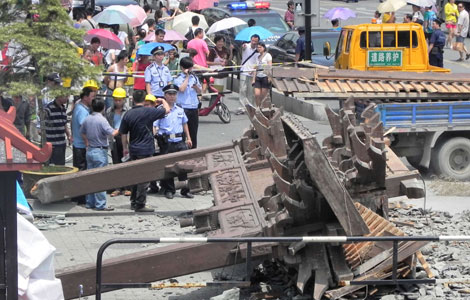
|
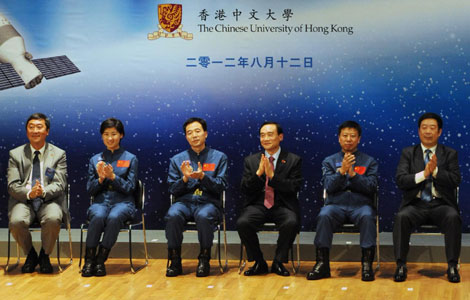
|

|

|

|

|



